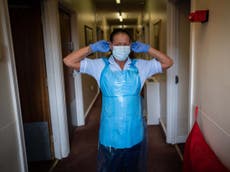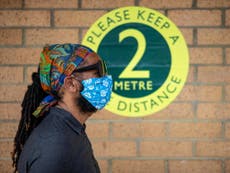Racism has contributed to risk of Bame communities dying from coronavirus, report finds
Unions call for immediate action to implement proposals in order to prevent further suffering in Bame communities
Racism and social inequality have contributed to the disproportionally high risk of Covid-19 for black and minority ethnic (Bame) communities, a government-commissioned report has revealed.
The study, prepared and published by Public Health England, found that historic racism may mean people are discriminated against when it comes to personal protective equipment (PPE) and may result in people from Bame backgrounds being less likely to seek care or demand better protection.
More than 4,000 people consulted for the latest paper “pointed to racism and discrimination experienced by communities and more specifically by Bame key workers as a root cause affecting health, and exposure risk and disease progression risk”.
The report made clear that those consulted did not feel the pandemic had created health inequalities, but instead exposed and exacerbated longstanding issues for Bame groups.
It outlined a seven-point plan on how to better protect Bame communities from coronavirus, including measures such as:
- Better data collection about ethnicity and religion, including having this recorded on death certificates;
- Making it law for health risk assessments to be carried out for BAME workers;
- Culturally sensitive public health messaging so that people, particularly those who may not speak English as a first language, can follow advice on how to protect themselves from Covid-19.
Unions have called on the government to “act now” and implement the proposals in order to prevent further unnecessary Covid-19 deaths among Bame communities.
Unison general secretary Dave Prentis said: “Words and promises to do something in the future won’t cut it any longer.
“The pandemic has brought home just how many frontline care and health employees are from black communities. They’ve suffered a heavy toll and need better protecting now, before the almost inevitable second Covid spike.”
Frances O’Grady, TUC general secretary, meanwhile called for “a fully funded action plan to tackle the structural racism that continues to blight Bame people’s life chances and health”.
Bame people are more likely to work in occupations with a higher risk of exposure to Covid-19 – including in health and social care professions, but also work as a cleaner, in public transport, or in retail.
“Historic racism and poorer experiences of healthcare or at work may mean that individuals in Bame groups are less likely to seek care when needed or as NHS staff are less likely to speak up when they have concerns about personal protective equipment (PPE) or risk,” it was suggested.
The housing challenges faced by some members of these communities were also highlighted as an issue. Overcrowding – which is a much larger problem in Bame households than in white British households, even allowing for regional differences – can make it difficult to self-isolate, leading to increased transmission.
Bame households are also more likely to be intergenerational, leading to concerns that younger members of the family may spread the infection to older relatives who are more at risk.
“Unpacking the relative contributions made by different factors is challenging as they do not all act independently,” the paper said.
It concludes that more investigation is needed to understand all the reasons behind the disproportionate risk being experienced by Bame groups. Further consideration is also urged of the likely economic impact of Covid-19 in these communities, concluding it will “likely be very long term and severe, with lasting health and wellbeing impacts”.
In its response to the initial Public Health England report, which was published on 2 June, the government pledged to commission further research on the disparities as well as review policy accordingly. The work is to be led by the equalities minister, Kemi Badenoch.
Subscribe to Independent Premium to bookmark this article
Want to bookmark your favourite articles and stories to read or reference later? Start your Independent Premium subscription today.





Join our commenting forum
Join thought-provoking conversations, follow other Independent readers and see their replies
Comments